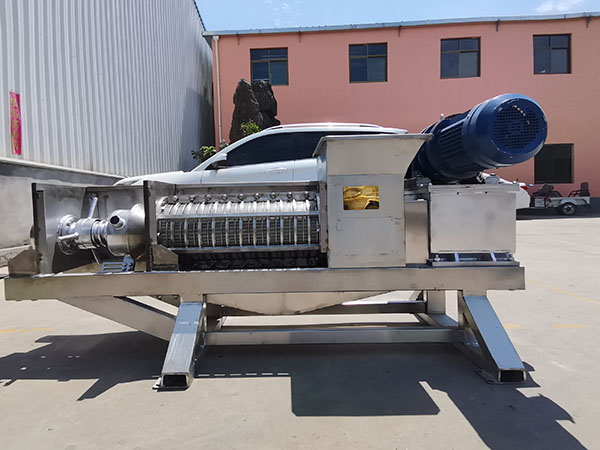Screw press dewatering machines have emerged as indispensable tools in various industrial sectors, offering efficient solid-liquid separation capabilities. Widely applied in agriculture, food processing, chemical engineering, and mining, these versatile machines contribute significantly to enhancing production efficiency, resource utilization, and environmental protection.
In Agriculture:
1. Dehydration of Agricultural Products:
Screw press dewatering machines play a crucial role in dewatering agricultural products such as extracting juice from vegetables and fruits, dewatering spent grains, Their efficient extrusion and separation functions swiftly eliminate excess moisture, extending the shelf life and reducing transportation costs.
2. Agricultural Waste Management:
Addressing environmental concerns, these machines efficiently squeeze moisture from agricultural waste like straw and fruit peels, transforming them into dried organic fertilizers or biomass fuels, promoting resource reuse and minimizing environmental pollution.

In Food Industry:
1. Wastewater Treatment:
In the food processing industry, large volumes of wastewater are generated, requiring proper treatment to meet environmental standards. Screw press dewatering machines facilitate solid-liquid separation, purifying the water quality and alleviating pressure on water resources.
2. Dehydration of Food Ingredients:
With abundant water content in food processing raw materials, screw press dewatering machines effectively remove excess moisture, enhancing material concentration and quality, thereby improving production efficiency.
In Chemical Engineering:
1. Sludge Handling:
Crucial for chemical production, these machines efficiently extricate water and organic materials from sludge, enabling the dry treatment of sludge for subsequent resource utilization or safe disposal, minimizing environmental impact.
2. Dehydration of Chemical Raw Materials:
Many chemical manufacturing processes involve raw materials with high water content. Screw press dewatering machines ensure efficient dehydration, ensuring raw materials meet production requirements and elevating product quality and yield.
In Mining:
1. Coal Gangue Treatment:
Addressing the challenge of high moisture content in coal gangue, screw press dewatering machines effectively reduce moisture, lowering transportation costs and facilitating rational resource utilization.
2. Slag Handling:
In mining operations, screw press dewatering machines aid in removing moisture from slag, making it easier to transport and process, ultimately reducing environmental impact.
Key Features:
Precision Extrusion Technology:
The screw press dewatering machine employs precision extrusion technology to delicately squeeze moisture from various materials. This results in a highly efficient and controlled process, ensuring optimal separation without compromising the integrity of the processed materials.
Versatility in Material Handling:
One of the standout features of this machine is its versatility in handling a wide range of materials. From agricultural produce to chemical sludge and mining by-products, the screw press adapts seamlessly, offering a universal solution for solid-liquid separation challenges.
Energy-Efficient Operation:
Designed with energy efficiency in mind, these machines utilize advanced mechanisms to minimize power consumption while maintaining high-performance levels. This not only reduces operational costs but also aligns with contemporary sustainability goals.
Conclusion
Screw press dewatering machines, with their multifunctional solid-liquid separation capabilities, have become integral in agriculture, food processing, chemical engineering, and mining. Their efficient performance signifies a pivotal role in increasing production efficiency, resource utilization, and environmental conservation. As an indispensable component of industrial processes, the screw press dewatering machine is poised to continue its crucial role in future industrial production.
Previous: How do I choose a skate bag?
Next: The Impact of Micronutrient Fertilizers on Wheat Yield Formation and Grain Quality
Copyright:@2020-2021
Comments Please sign in or sign up to post.
0
0 of 500 characters used